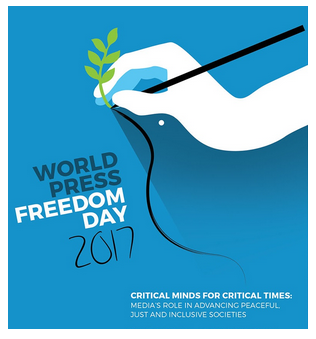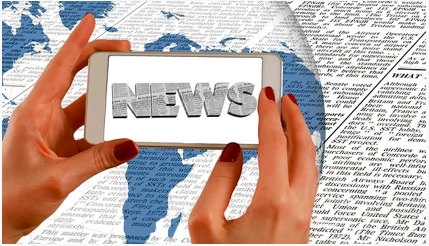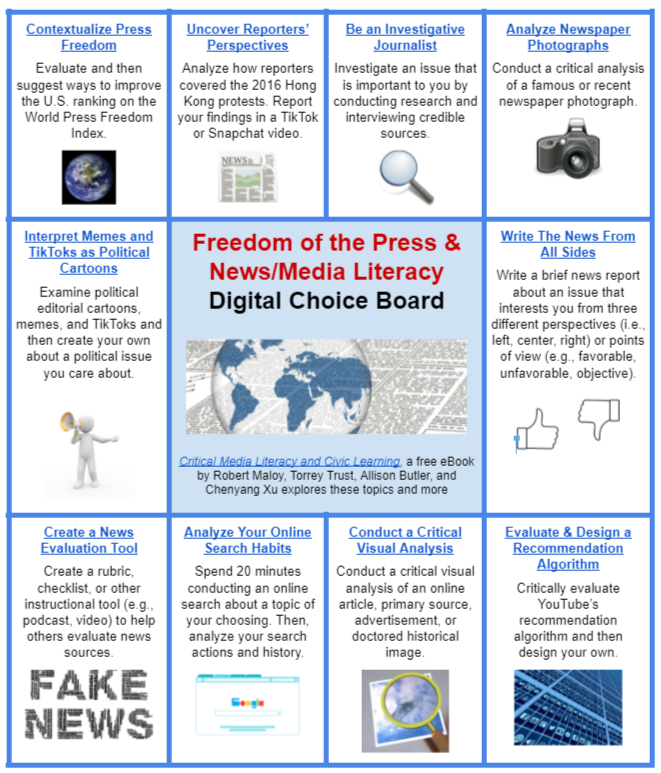 World Press Freedom Day 2017 Poster from UNESCO licensed under CC BY-SA 3.0-igo
World Press Freedom Day 2017 Poster from UNESCO licensed under CC BY-SA 3.0-igoSnapshot of Topic 7
As you explore this topic's standards and modules about the freedom of the press and news/media literacy, consider the following question: How is a free press essential to democratic government?
Massachusetts Standards [8.T7.1-6]
- Freedom of the Press
- Competing Information in a Free Press
- Writing the News: Functions of Different Formats
- Digital News and Social Media
- Evaluating Print and Online Media
- Analyze Editorials, Editorial Cartoons or Op-Ed Commentaries
Advanced Placement Standards
- AP Government and Politics Unit 3.4: First Amendment/Freedom of the Press
- AP Government and Politics Unit 5.12: The Media
- AP Government and Politics Unit 5.13: Changing Media
Topic 7 explores the role of the Press in reporting the News in 21st century America's digital age. The News is everything of importance that happens when we are not physically present to see it for ourselves. Since we were not there, we rely on the Press to report it to us.
The Press and the Fifth Estate
The Press is a broad term, referring to the people (reporters, photographers, commentators, editorial writers and behind-the-scenes workers in media organizations) that bring us the news. It is known as the Fourth Estate or the Fourth Branch of government in our democracy because it is intended to report openly and fairly on what is happening in the community, the nation and the world.
Some researchers are now referring to social media as the Fifth Estate (Educators Meet the Fifth Estate: Social Media in Education, Elementary School Journal Special Issue, 2021).
This meaning of the word "Press" derives from Johann Gutenberg's history-altering invention in the 1440s of the movable type printing press, a technology that could produce 4000 pages a day, more than 1000 times what an individual human could write by hand. Initially, a printer or publishing house were called the press, but since the 18th century, journalists and the newspaper industry have been known as the press.
In the 1938 case Lovell v. City of Griffin, Supreme Court Justice Charles Evans Hughes authored a legal definition of the press as "every sort of publication which affords a vehicle of information and opinion." That decision overturned the conviction of a Jehovah Witness who had gone door to door selling religious pamphlets and magazine. Hughes said those materials were part of the press and protected by the freedom of the press clause of the First Amendment to the Constitution. Today, the press means forms of publication from newspapers to blogs.
All of us members of a democratic system of government rely on the people of the press to report the news about what happens in our neighborhood, city or town, state, nation, and world and help us make sense of what it means for our lives. Only when there is clear and unbiased information available from the press can people make decisions about what public policies and governmental actions they want to support or oppose.
 Image by Gerd Altmann licensed under CC.0 1.0
Image by Gerd Altmann licensed under CC.0 1.0Getting the News from the Press
The press includes organizations large and small—including the New York Times and the Washington Post newspapers, national television networks like NBC, CNN, or Fox, public radio, and local community-based publications and television stations. It includes writers and journalists, well-known and locally prominent, as well as bloggers and online commentators. The press includes print materials, multimedia (e.g., videos, podcasts, infographics), and social media (e.g., posts and tweets).
World Press Freedom Day has been celebrated around the world on May 3 every year since 1991 by UNESCO (United Nations Educational, Scientific and Cultural Organization).
Today's students are immersed in a world of computers, smartphones, apps, interactive digital tools, and instantaneously available online information. They get news and political information from Google, Facebook, YouTube, Instagram, Twitter, Reddit, Snapchat and other digital sources unlike older generations of Americans who grew up reading newspapers and magazines, watching television, listening to the radio, and talking about politics in coffee places, lunchrooms, barber shops, community centers, and family dinner tables.
Students are challenged by how different media present facts and opinions in highly polarized political environments. The Rand Corporation's 2018 report, Truth Decay, identified four alarming trends is how news is presented to readers and viewers in our digital age:
- increasing disagreement about objective facts, data, and analysis;
- a blurring of the line between fact and opinion;
- an increasing relative volume of opinion over fact; and
- declining trust in government, media, and other institutions that used to be sources of factual information (Kavanagh & Rich, 2018)
Given these trends, there is a pressing need for everyone to develop the critical media literacy skills to identify and rely on fact-based media that report the news fully, objectively and ethically in digital, electronic and print formats. How students go about understanding and utilizing the media creates multiple challenges and opportunities for sustaining and energizing our democratic systems of government.
To build news and media literacy, students and teachers can go to PBS Newshour Classroom for learning activities including a daily news lesson.

Freedom of the Press & News/Media Literacy Choice Board (view)
(make your own copy of this choice board to remix/share/use)
Topic 7 Chapters